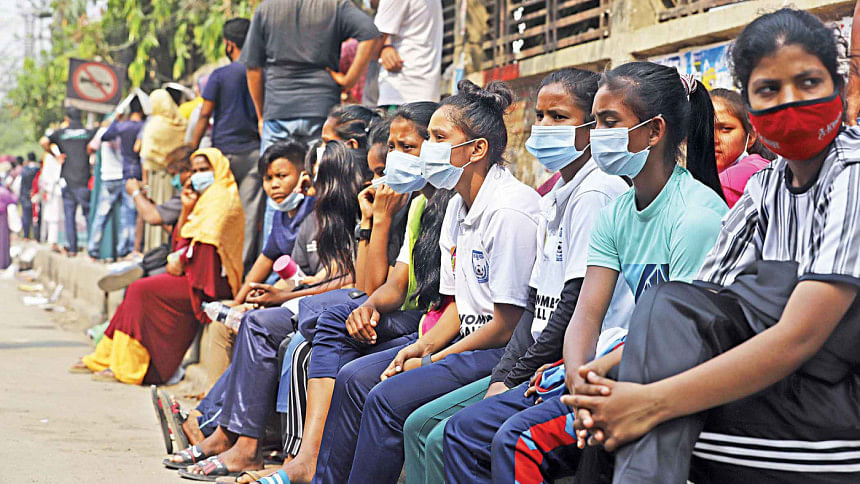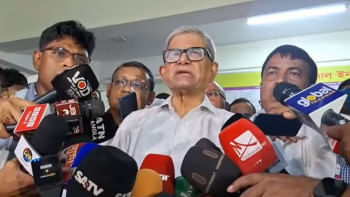Infections gallop amid slow response

In the wake of the second Covid-19 wave in the country, the government's efforts to check virus transmission and ensure treatment are still inadequate in view of the ground reality.
Despite the health directorate's recommendations for enforcing a lockdown and taking other strict measures, the government's efforts remain limited to distribution of masks and directives for following health safety guidelines.
The government has not been able to strictly enforce the health safety rules, a key instrument in the fight against virus transmission. A large section of the population is still reluctant to wear masks though it is mandatory to use those in public places.
Its preparations fall short of the required level in case the health system gets overstretched due to a surge in infections.
The health directorate has not been successful in increasing the number of Covid tests and providing central oxygen supply, ICU support and necessary equipment to public hospitals across the country.
Meanwhile, the directorate yesterday reported 3,567 new Covid cases -- the highest in nearly nine months. It recorded 28 more deaths from the virus.
Speaking at a programme in the city, Health Minister Zahid Maleque yesterday said that if Covid infections keep spreading this fast, the existing health system will not be able to handle the situation.
Against this backdrop, experts have recommended enforcing health safety rules strictly, increasing the number of daily tests, and ensuring that the Covid patients are kept isolated to check virus transmission.
Talking to The Daily Star yesterday, Dr Mushtuq Hussain, consultant at the Institute of Epidemiology, Disease Control and Research, said, "The government has not yet taken all-out measures to tackle the situation. It is not showing the urgency like it did in November last year to encourage people to follow health safety guidelines. Besides, surveillance activities to detect and isolate new cases are not adequate."
At a meeting with high-ups of the Prime Minister's Office last week, the health directorate placed a set of recommendations to keep the virus transmission in check. Those include a lockdown across the country, restrictions on mass gatherings and programmes, and limiting opening hours of markets and shopping malls.
It also called for strengthening screening at all entry points to the country -- airports, seaports and land ports -- and quarantining those who come in contact with Covid-infected people.
The directorate also suggested keeping all educational institutions shut and not holding any public examinations at this moment.
SHARP RISE IN INFECTIONS
A total of 3,567 cases were detected against 25,954 tests in 24 hours till 8:00am yesterday -- the highest since July 2 last year when 4,019 people tested positive for the virus.
Data shows the number of daily cases increased nearly sevenfold in three weeks from 515 cases recorded on March 2.
Last year, the same rise in infections took more than six weeks. The number of daily cases stood at 3,471 on June 12 compared to 497 on April 27 last year.
Yesterday's positivity rate of 12.97 percent is almost four times that of 3.36 percent recorded on March 2.
HOSPITALS OVERBURDENED
The DGHS data shows that Kurmitola General Hospital in the capital was overburdened by a huge number of patients for the last few days.
Yesterday, an additional 123 Covid patients were admitted to the hospital that can accommodate 275 patients. All 10 ICU beds were already occupied.
The situation was similar at nine other government hospitals in the city dedicated for Covid patients. Only seven of the 103 ICU beds at these hospitals were vacant.
"The most worrying thing is that the majority of patients are rapidly developing severe symptoms and they need high-flow oxygen support. We feel helpless when we need to provide patients with high-flow nasal cannula that is in short supply," Dr Farhana Wahab, consultant at Kuwait-Bangladesh Friendship Hospital, told this correspondent.
There was no high-flow nasal cannula at the general wards of the hospital, which was the first to start treating Covid patients in February last year.
During a visit to the Covid unit of Dhaka Medical College and Hospital yesterday, a mid-level staffer of the unit told this correspondent that the eight Covid wards at the hospital has one high-flow nasal cannula each.
Contacted, Prof Nazrul Islam, member of the National Technical Advisory Committee on Covid-19, said, "The government has failed in terms of management of the hospitals for Covid patients. Though it has a year's experience of dealing with the pandemic, we are still seeing an acute shortage of ICU beds, high-flow oxygen support and other equipment at the hospitals."
However, the health minister yesterday said, "We are increasing the number of hospital beds for Covid-19 patients. But if people do not wear masks and abide by the health safety guidelines, it will be tough to tackle the Covid situation in the coming days."

 For all latest news, follow The Daily Star's Google News channel.
For all latest news, follow The Daily Star's Google News channel. 



Comments